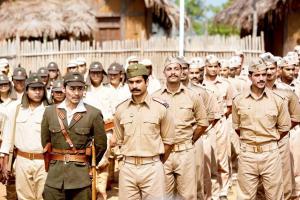The Forgotten Army is a love story between that young officer and a stunning Singaporean girl of Indian origin (Sharvari), equally besotted by the romance of rebellion and war

A still from The Forgotten Army
The Forgotten Army
On: Amazon Prime
Director: Kabir Khan
Cast: Sunny Kaushal, Sharvari
Rating: 
ADVERTISEMENT
Besides the anecdotal story-telling, which is riveting enough on its own, what strikes you about The Forgotten Army — a five-part Amazon Prime mini-series on Subhas Chandra Bose's Indian National Army (INA) — is one of the main conflicts at the centre of this script. Which is? The fact that the INA soldiers (in real-life, as in the series) belonged to the British Indian Army. They had been taken in as prisoners of war, when the British lost to the Japanese in the Battle of Singapore (1942) during WWII.
Given Bose's proximity to the Japanese dictatorship, since they shared a common enemy — the Brits in India, of course — these soldiers got recruited to attack their own army from Burma, and occupy Delhi eventually, as it were. Among soldiers, the idea of the traitor, or turning rogue, and indeed allegiance to the flag they fight under, reigns supreme. It's non-negotiable; writ in stone.
How do the same soldiers, and in the case of the lead character Sodhi (Sunny Kaushal) who's a fourth-generation Army-man, reconcile himself to killing army-men who were his fellow Indian soldiers up until the day before a change of heart? And where does the idea of patriotism lie in all of this?
It must've been a tough choice to make — with the Bhagavad Gita as the guiding light, no less. Hadn't quite thought of this obvious dilemma before. What else does the film shine a light on? INA's Rani Jhansi regiment, the first women's regiment in the history of war. Its significance should be lost on no one. The statistics behind this story are staggering anyway — that 2.5 lakh Indian soldiers fought WWII; 90,000 Brit soldiers lost out to a Japanese Army of 30,000 in the Battle of Singapore; and that 50,000 soldiers joined INA to take on the weakened but very much the British Empire, on Bose's command.
Mentioning these things for a simple reason. It's the very reason you must watch this series. For, what could be fresh or new about Bose and the INA, that hasn't been featured as the flavour of multiple seasons in the same year (2017) — right from Vishal Bhardwaj's Rangoon, that was about an INA soldier (Shahid Kapoor) in the Indo-Burmese border; Tigmanshu Dhulia's Raag Desh, on the Red Fort trial and joint court-martial of INA officers; or indeed the nine-part biographical series Bose:Dead/Alive, featuring Rajkummar Rao as the founder of INA.
Watch the trailer of Sunny kaushal, Sharvari starrer series The Forgotten Army here
This one is sub-altern history, primarily from the viewpoint of one soldier's life that, I'm told, is based on a documentary of the same name that Kabir Khan directed couple of decades ago. The film flits between 1942 and 1996, interspersed on occasion with archival footage, bringing to the fore the sort of truth that's essential for it to resonate with current audiences. Think of this device as a bit of Rakeysh Omprakash Mehra's Rang De Basanti (2006) if you like, although having re-watched that film lately, appears it hasn't aged too well (but that's another matter).
Beyond everything else, this series is a love story between that young officer and a stunning Singaporean girl of Indian origin (Sharvari), equally besotted by the romance of rebellion and war. Are we gently segueing into a Bollywood territory? For sure, given the melodic background score (Pritam), and indeed the general idiom that's as desi mainstream as you should expect from Khan (Bajrangi Bhaijaan, Ek Tha Tiger), with as strong a grip on craft — camerawork, sound/production design — as anyone you're likely to come across.
And yet, this is without doubt the most accomplished Indian war film/series that I've seen — sharp and thoughtful in its detailing, and unsparingly grand and rich with the bigger picture. This fine balance between subtle and sensational is in my books the toughest thing to strike in movies. Sure, some of the 1996 portions may seem thoda sa incredulous or over-the-top. But what's not there not to go generally sentimental about a story of the INA. Their deaths being inevitable, honestly, it's hard to decide, if theirs was an act of daredevilry or pure deewanapan (madness).
The deewanapan shows through in this miniseries, with an excellently handpicked cast. Let alone the leads cracking it, it's just lovely to see some Delhi theatre veterans on screen, whether for long passages (MK Raina plays the older Sodhi), or even minor appearances (Sudhanva Deshpande, Sushma Seth). Does the film sway you by the idea of losing yourself for the freedom of future generations?
Our freedom fighters did. Many stood behind Gandhi, and his non-violent movement, which it can be suitably argued actually won India its independence from imperial rule. The INA, one could debate, was almost naïve as an experiment. There's an element of that here too. Or don't know if I'm saying this, having watched The Forgotten Army pretty much right after Sam Mendes's Oscar toast 1917 — arguably the strongest anti-war statement in the history of movies. But that's just a larger, personal view. No bearing on the top-notch quality of this beautiful and ballsy war film, or series, as it were.
Catch up on all the latest entertainment news and gossip here. Also download the new mid-day Android and iOS apps to get latest updates
 Subscribe today by clicking the link and stay updated with the latest news!" Click here!
Subscribe today by clicking the link and stay updated with the latest news!" Click here!







